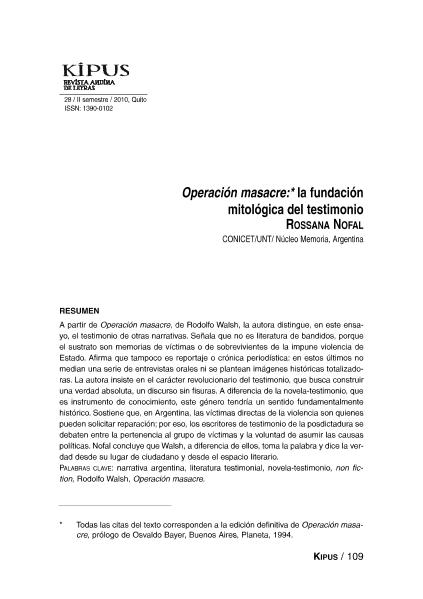Artículo
A partir de Operación masacre, de Rodolfo Walsh, la autora distingue, en este ensayo, el testimonio de otras narrativas. Señala que no es literatura de bandidos, porque el sustrato son memorias de víctimas o de sobrevivientes de la impune violencia de Estado. Afirma que tampoco es reportaje o crónica periodística: en estos últimos no median una serie de entrevistas orales ni se plantean imágenes históricas totalizadoras. La autora insiste en el carácter revolucionario del testimonio, que busca construir una verdad absoluta, un discurso sin fisuras. A diferencia de la novela-testimonio, que es instrumento de conocimiento, este género tendría un sentido fundamentalmente histórico. Sostiene que, en Argentina, las víctimas directas de la violencia son quienes pueden solicitar reparación; por eso, los escritores de testimonio de la posdictadura se debaten entre la pertenencia al grupo de víctimas y la voluntad de asumir las causas políticas. Nofal concluye que Walsh, a diferencia de ellos, toma la palabra y dice la verdad desde su lugar de ciudadano y desde el espacio literario. Using Rodolfo Walsh’s Operación Masacre as a starting point, the author draws attention, in this essay, to the testimony in other narratives. She points out that this is no bandits’ literature, since the underlying story is the memoir of victims or survivors of the unpunished violence of the State. She also claims it is neither an article nor a news chronicle: in these, there are no series of oral interviews or there is no outlining of totalizing historical images. The author insists upon the revolutionary nature of testimony, striving to build a definite truth, a discourse with no gaps. In contrast with testimonial novels, which are tools of knowledge, this genre’s meaning would be primarily historical. She also states that in Argentina the direct victims of violence are entitled to ask for retribution; under this consideration, testimony writers of the post-dictatorship period balance themselves between the belonging to the victims’ groups and the will to assume political causes. Nofal concludes saying that Walsh, unlike those authors, takes on a voice and speaks the truth from his position as a citizen and from a libertarian space. KEY WORDS: Argentinean narrative, testimonial literature, testimony-novel, non-fiction, Rodolfo Walsh, Operación Masacre.
Operación masacre: la fundación mitológica del testimonio
Fecha de publicación:
06/2010
Editorial:
Universidad Andina Simón Bolívar
Revista:
Kipus. Revista Andina de Literatura
ISSN:
1390-0102
Idioma:
Español
Tipo de recurso:
Artículo publicado
Clasificación temática:
Resumen
Palabras clave:
Testimonio
,
Memoria
,
Militancia
,
Resistencia
Archivos asociados
Licencia
Identificadores
Colecciones
Articulos(INVELEC)
Articulos de INSTITUTO DE INVESTIGACIONES SOBRE EL LENGUAJE Y LA CULTURA
Articulos de INSTITUTO DE INVESTIGACIONES SOBRE EL LENGUAJE Y LA CULTURA
Citación
Nofal, Silvia Rossana; Operación masacre: la fundación mitológica del testimonio; Universidad Andina Simón Bolívar; Kipus. Revista Andina de Literatura; 28; 28; 6-2010; 109-132
Compartir




